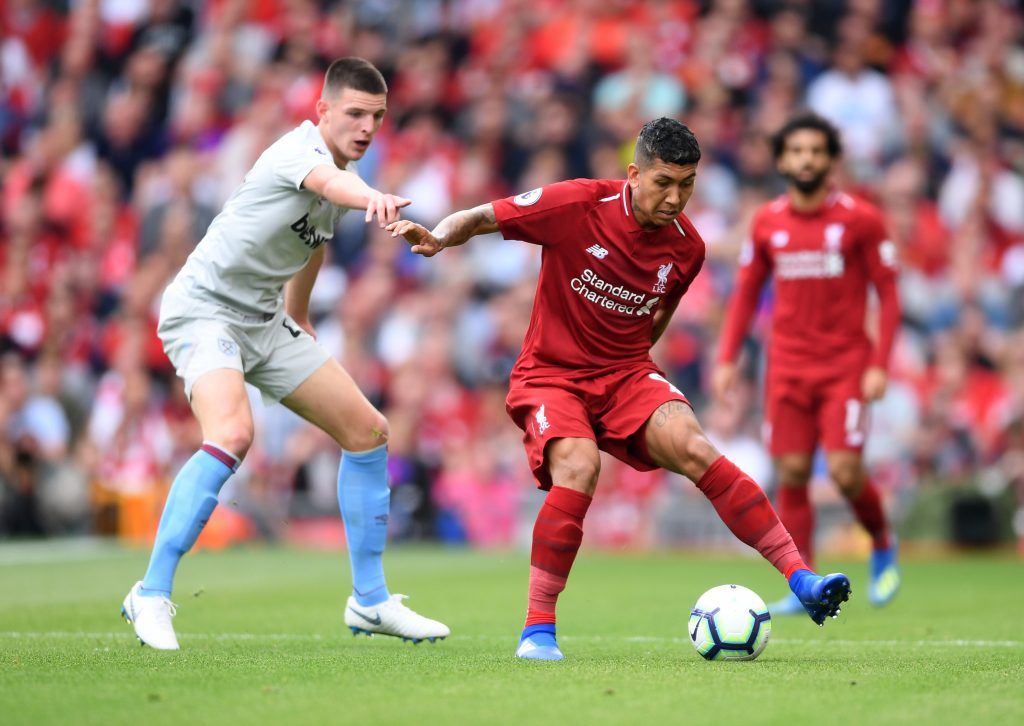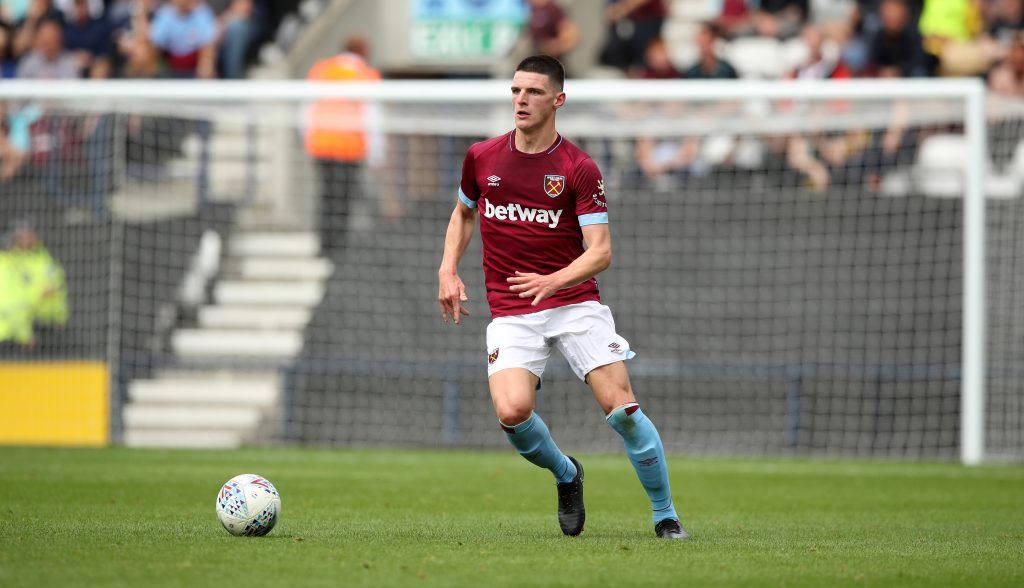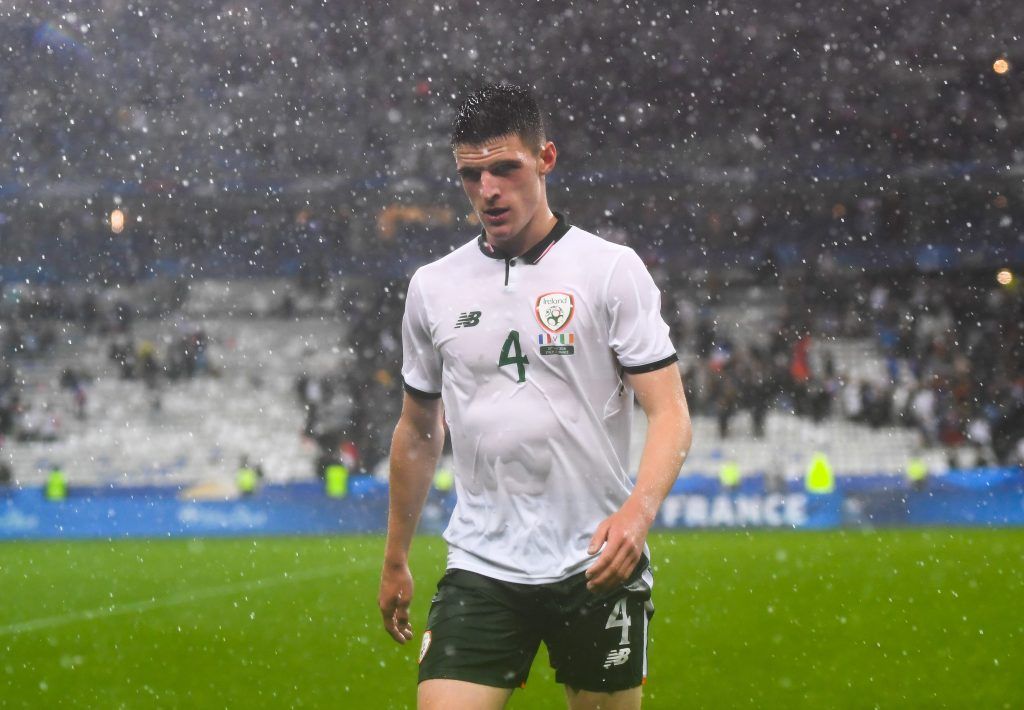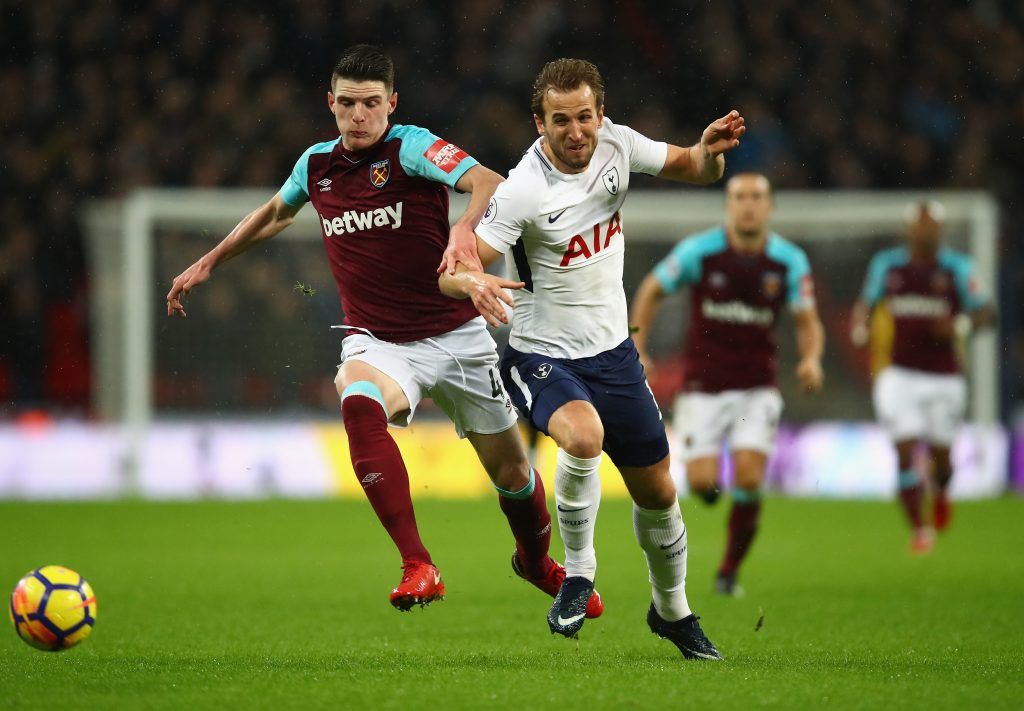

Share
27th August 2018
04:52pm BST

 Rice is also a professional footballer, and the word "professional" needs to be highlighted. He has to follow his head as much as his heart and make a decision that will help his career prospects.
If he feels that his career will progress by representing Ireland and becoming a key part of the team as they seek to qualify for Euro 2020, then that would be brilliant for the national side.
However, if he feels that representing England is a more favourable career move, that also has to be respected. Rice will earn more money and have a greater profile representing England at international level.
Professional football may be a lucrative career, but it is also a short one, and a player is right to make the most of it while they can.
https://www.sportsjoe.ie/football/declan-rice-ireland-midfield-162524
Harry Maguire is valued at £75m after impressing for England at the World Cup. If he had played for Ireland, would he be rated so highly or have such a big profile? If Seamus Coleman represented England, would he not be playing for a Champions League team by now?
We would like to think that professional football is a meritocracy, that the best will reach the top based on their ability and hard work, but it doesn't always work that way. The higher your profile, the better chance you have of making it to a big club, earning big money and winning trophies.
Playing for England also offers Rice the chance to feature at the highest level, something every footballer wants to do. Gareth Southgate's team reached the semi-finals of the World Cup. The semi-finals and the final of Euro 2020 will be staged at Wembley. They will have a great chance of making an impact at the tournament in two years' time and such an experience is a once in a lifetime opportunity for a footballer.
Rice is also a professional footballer, and the word "professional" needs to be highlighted. He has to follow his head as much as his heart and make a decision that will help his career prospects.
If he feels that his career will progress by representing Ireland and becoming a key part of the team as they seek to qualify for Euro 2020, then that would be brilliant for the national side.
However, if he feels that representing England is a more favourable career move, that also has to be respected. Rice will earn more money and have a greater profile representing England at international level.
Professional football may be a lucrative career, but it is also a short one, and a player is right to make the most of it while they can.
https://www.sportsjoe.ie/football/declan-rice-ireland-midfield-162524
Harry Maguire is valued at £75m after impressing for England at the World Cup. If he had played for Ireland, would he be rated so highly or have such a big profile? If Seamus Coleman represented England, would he not be playing for a Champions League team by now?
We would like to think that professional football is a meritocracy, that the best will reach the top based on their ability and hard work, but it doesn't always work that way. The higher your profile, the better chance you have of making it to a big club, earning big money and winning trophies.
Playing for England also offers Rice the chance to feature at the highest level, something every footballer wants to do. Gareth Southgate's team reached the semi-finals of the World Cup. The semi-finals and the final of Euro 2020 will be staged at Wembley. They will have a great chance of making an impact at the tournament in two years' time and such an experience is a once in a lifetime opportunity for a footballer.
 Judging by the squad O'Neill named on Monday, Ireland will be fortunate to reach the European Championships. The current squad would, unfortunately, do little to entice a footballer unsure about their international future. The country last qualified for a World Cup in 2002.
The uncomfortable truth is that Rice is probably right to try play for England if that is what he eventually decides to do.
Southgate has talented players but the playing pool is somewhat shallow in comparison to 10 or 20 years ago. If Rice can play regularly over the next two seasons, he will be in contention for the England squad and the manager clearly rates him if he has made contact.
Judging by the squad O'Neill named on Monday, Ireland will be fortunate to reach the European Championships. The current squad would, unfortunately, do little to entice a footballer unsure about their international future. The country last qualified for a World Cup in 2002.
The uncomfortable truth is that Rice is probably right to try play for England if that is what he eventually decides to do.
Southgate has talented players but the playing pool is somewhat shallow in comparison to 10 or 20 years ago. If Rice can play regularly over the next two seasons, he will be in contention for the England squad and the manager clearly rates him if he has made contact.
 Like Jack Grealish, Rice is more than capable of playing for the country. The 19-year-old is a central defender by trade but impressed for Ireland in central midfield. At the World Cup, Southgate had defenders such as Gary Cahill and Phil Jones in the squad, and midfielders such as Jordan Henderson and Ruben Loftus-Cheek.
Rice may not be better than any of those players at the moment, but in two years' time, he could be ahead of them. He is very talented, comfortable on the ball, intelligent and he reads the game well. He has the potential to play at a high level.
If Rice does decide to switch allegiance to England, Irish football should use this as a moment for reflection, rather than turning on a teenager. Ireland has relied on another country to develop players for decades and it is no longer a feasible model.
Like Jack Grealish, Rice is more than capable of playing for the country. The 19-year-old is a central defender by trade but impressed for Ireland in central midfield. At the World Cup, Southgate had defenders such as Gary Cahill and Phil Jones in the squad, and midfielders such as Jordan Henderson and Ruben Loftus-Cheek.
Rice may not be better than any of those players at the moment, but in two years' time, he could be ahead of them. He is very talented, comfortable on the ball, intelligent and he reads the game well. He has the potential to play at a high level.
If Rice does decide to switch allegiance to England, Irish football should use this as a moment for reflection, rather than turning on a teenager. Ireland has relied on another country to develop players for decades and it is no longer a feasible model.
 If Ireland is to ever have a national team that can regularly qualify for major tournaments, we can't just rely on British players of Irish heritage to declare for the national team.
For far too long, Irish football has depended on English football, using it as a market to export players and as a way to recruit players eligible to play for Ireland. Those avenues are now closing. Talented English players of Irish descent are being selected for their national team and English football doesn't need Irish players the way it once did. That should be of greater concern than a 19-year-old who isn't sure about which country to represent.
If Ireland is to ever have a national team that can regularly qualify for major tournaments, we can't just rely on British players of Irish heritage to declare for the national team.
For far too long, Irish football has depended on English football, using it as a market to export players and as a way to recruit players eligible to play for Ireland. Those avenues are now closing. Talented English players of Irish descent are being selected for their national team and English football doesn't need Irish players the way it once did. That should be of greater concern than a 19-year-old who isn't sure about which country to represent.Explore more on these topics: